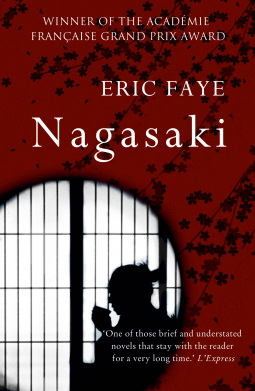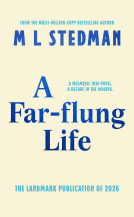
Nagasaki
by Eric Faye
This title was previously available on NetGalley and is now archived.
Send NetGalley books directly to your Kindle or Kindle app
1
To read on a Kindle or Kindle app, please add kindle@netgalley.com as an approved email address to receive files in your Amazon account. Click here for step-by-step instructions.
2
Also find your Kindle email address within your Amazon account, and enter it here.
Pub Date 20 Jan 2015 | Archive Date 17 Sep 2015
Description
Winner of the Académie française Grand Prix Award.
"One of those brief and understated novels that stay with the reader for a very long time."—L'Express
"Speaks directly to the heart."—Le Monde
"Eric Faye is a rare talent."—Le Figaro
There were just eight centimeters of juice now, though I'd measured fifteen before leaving the house . . . Someone had been helping themselves. And I live alone.
In a house on a suburban street in Nagasaki, meteorologist Shimura Kobo lives quietly on his own. Or so he believes. Food begins to go missing. Perturbed by this threat to his orderly life, Shimura sets up a webcam to monitor his home.
But though eager to identify his intruder, is Shimura really prepared for what the camera will reveal?
Nagasaki is based on a real news story. In 2008, a Japanese woman was found to have been secretly living in a man's house for over a year, by hiding and sleeping in a wardrobe. Éric Faye has taken this news item and transformed it into a heart-rending story about the alienation of modern life.
Born in Limoges, Éric Faye is a journalist and the prize-winning author of over twenty books.
Advance Praise
Speaks directly to the heart --Le Monde
Elegantly, without ever raising his voice, Éric Faye considers guilt, memory, our fragile sense of how to behave, and the selfishness of societies. --L'Express
Available Editions
| EDITION | Other Format |
| ISBN | 9781908313652 |
| PRICE | $12.95 (USD) |
Average rating from 26 members
Featured Reviews
 Nikhil S, Reviewer
Nikhil S, Reviewer
Éric Faye's novella begins with Shimura Kobo, a fifty-six year old meteorologist, Catholic, living all by himself in the Shimabara district of Nagasaki, growing suspicious that somebody is sneaking into his home when he's gone to his office. His habit for tidiness gives him hints about which things have moved or been touched behind him. But his doubts become stronger, as he plunges a strip of measured blank paper into a carton of fruit juice and "waited a few seconds, just long enough for my probe to soak up the liquid, and then I slowly pulled it out. I hardly dared look. Eight centimetres, I read". He can't point his doubts to any specific being or non-being, but continues to eye everyone: "...I often go to feed our kami at the local shrine, but it never occurred to me for one moment they would come into people's houses and help themselves". But finally he acts to quell his discomfort and installs a video-recorder in his kitchen, and not much later, discovers that an old-lady is in his kitchen making tea for herself while he is in office watching her on his computer screen. He calls the police and informs them of a possible burglar ("I was careful not to add 'to make themselves a cup of tea'").
The 'burglar' was living in his home for around a year and was a homeless fifty-eight year woman. For Shimura, a man of the private kind, this is too much to fathom. All the while he spent his time in his home during last one year, he was not alone but was in company of a stowaway, just like "Nagasaki had for a long time remained a kind of closet right at the far end of the vast apartment that was Japan, with its four adjoining main rooms - Hokkaido, Honshu, Shikoku and Kyushu; and for all of those two hundred and fifty years, the empire had, as it were, pretended not to notice that a stowaway - that is to say, Europe - had moved into this wardrobe". But the woman had carefully chosen her place in his home, for she had spent her childhood in the same home. Her parents had died when she was sixteen, and since then had lived a life of which there was not much to talk about. When became unemployed and homeless, she wondered, "At night, lying down, the same thought kept coming back to me: this whole thing is a prank. One big joke. Sooner or later, I'll get an explanation. I'll be offered excuses and I will know the truth. We will all achieve enlightenment. It's destined to happen, only we don't know when", but then despaired existentially, "...the time didn't come. Every night, I lay down full of confidence. It was all a bit of fun and everything would be back to normal in the morning...It simply wasn't possible that everything could be so utterly senseless, the stars, the wind, humankind. If there's one ting I became sure of in the course of those weeks, it was this: there is no meaning. That is to say, it didn't exist before we did. The idea of meaning was invented by humans as a balm to their anxieties, and their quest to find it is obsessive, all-consuming".
Shimura, realizing that he doesn't anymore feel at home, puts it up on sale, and the lady and man have now both lost their homes. Their possessiveness created many of a kind from just one of a kind. She writes to him that like turtles and salmons, she had come back to her own place to die and that she was only a "pilgrim of time".
Nagasaki evokes a sense of loss towards the distended time which has flown past us, and in an attempt to hold on to it or gather it in our palms, we break it further into distorted grains of pained memories. Faye sews together melancholia with the absurdities of life, leaving a lingering taste of our fear of being rootless. The outsider is not so much so when he reveals himself.
 Reviewer 282220
Reviewer 282220
A novella that was apparently based on a true story about a woman living in a house for nearly a year without the occupant knowing. A gentle story about loss, loneliness and alienation but also about intrusion and violation. Some people may feel it needed to be longer to develop the characters but I felt it was about right.
 Chris M, Reviewer
Chris M, Reviewer
I received an ARC copy of the e-book version of this novel from the publisher through NetGalley in exchange for an honest review.
A very interesting story set in, as you can guess, Nagasaki. Our protagonist lives alone, by design rather than necessity. Alone, a cog in a much larger machine, a low level and low pay grade meteorologist who creates comfort, without any attempt at meaning or fulfillment in his life, by the strict adherence to routine. He avoids the company of workmates because that would disrupt his daily structure. He doesn’t trust anything or anyone outside himself anyway and minimizes all contact with people in the workplace or outside. It has been over a year since he has seen a member of his own family. At work he immerses himself in weather patterns; at home his nightly rituals.
He is an island.
Until he realizes that he isn’t alone. Someone is in his home. Eating his food. Walking his house. Invading his world. He is no longer alone. He has been violated.
If this story were written by an American author the story would have gone one way. Probably the confrontation of the individualist (we all think of ourselves that way, right? even though it is the punchline from a joke—sure, you are unique, just like everybody else) with the intruder. Gogol or Kafka would have gone another way—the inevitable violation of the individual by a stronger force. But this story is set in Japan and it is very different in ways that I did not expect. Much more personal. Much more moving. With a perspective shift (which often don’t work but this time does very well) near the end that makes us re-evaluate our feelings toward the entire story.
Goodreads https://www.goodreads.com/review/show/1392195394
Amazon http://www.amazon.com/review/R1FAKIEY65Q7SC/ref=cm_cr_rdp_perm?ie=UTF8&ASIN=190831365X
Also published on Twitter and Google Plus
 Reviewer 170184
Reviewer 170184
Meteorologist Shimura Kobo lives alone and has for years. Everything has its place and order. Kobo doesn't want it any way.
But when he notices that food is going missing, he sets up a webcam in his home to find the thief. But by doing this what will happen to his life once he discovers the truth? Kobo soon learns you can't go back after certain decisions in life.
*Short Review*
When I read the summary to this book I was expecting some huge turn of events that dramatically changes Kobo's life. Finding out the truth about the intruder in his home was life changing for Kobo but not as spectacular as the summary appeared it to be.
Kobo's life is as simple as it can get: work, grocery store and the home. He lives alone, doesn't have any friends, rarely interacts with his coworkers and doesn't really care to change the situation he is in. When he notices that someone has been in his house, he becomes obsessed with finding out who the person is and when he finds out who the person is, he becomes obsessed with how he has been living his life.
This isn't an issue with this book. My issue with this book was the lack of passion, the lack of conversation and the lack of some kind of solution. I am aware that this book is based on true events and I am also aware that some people live their lives like this but I wanted more emotion and there was none to be found other than pity for Kobo.
Overall, as quick of a read this was, reading it has done nothing to shape my life in anyway. I loved the idea of the story but I was hoping for more after the thief was found.
2 Pickles
I really enjoy Asian fiction and this novella was certainly an intriguing read. As Shimura Kobo lives the quiet life of a solitary bachelor he is unaware that he is, in fact, sharing his apartment with a stowaway in the tatami cupboard. As food disappears and objects mysterious move around his apartment, he sets up a hidden camera intending to capture what is really going on when he is out at work.. Beautifully written, this is a commentary on isolation in the modern world, on shadow people who live unnoticed on the fringes of society and where even families become dissociated from one another. Kobo and his flatmate share striking similarities, yet, like the other minor players in the novel there is a huge distance between them. Highly recommended.
 Anita W, Reviewer
Anita W, Reviewer
This novella by Eric Faye is based on real events. It's a strange and rather disturbing tale about a homeless lady who moves into a cupboard in an apartment owned by a late middle aged gent.
Kobo Shimura works as a meteorologist. It's clear from the outset that he's idiosyncratic, with hints of OCD. He's a loner who finds it difficult to relate to people socially. He notices things in his refrigerator are slightly out of place and he determines to find out why things are not as he left them. It's a strange tale of loneliness and isolation.
However, there's a much deeper undercurrent in a narrative which succinctly explores the very nature of society. There's not a spare word in a text which draws the reader into what seems, initially, to be an alien world. But on reflection, the sub text is truly powerful. Shimura's view of the world is then challenged by the intruder's narrative. The reader has the privilege of her insight and the dire economic circumstance, both personal and national, which lead her to knowingly take up residence in someone else's home.
I can't say I felt much empathy for either character; but I found the story totally compelling. It's very understated, but the themes explored are huge and it's thought provoking, profound and articulate in equal measure. It's stayed with me, both literally and visually. That's always a sign of powerful writing, with something to say.
My thanks to Gallic Press for a review copy via Netgalley.
Readers who liked this book also liked:
Catherine Merridale
General Fiction (Adult), Historical Fiction, Mystery & Thrillers
Linda Collister; National Trust Books
Cooking, Food & Wine, Crafts & Hobbies, Home & Garden


















